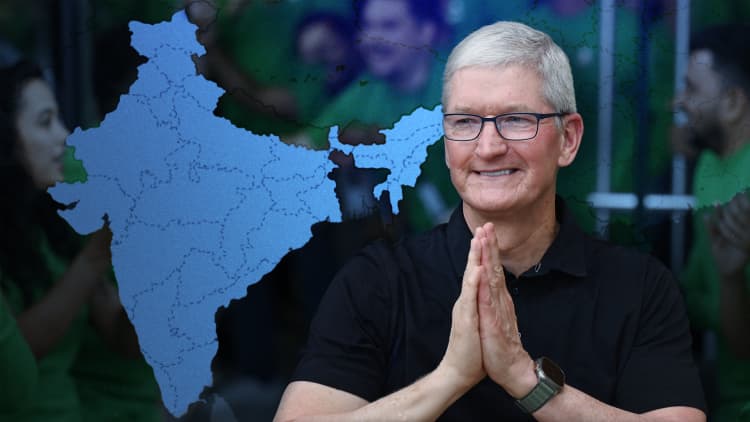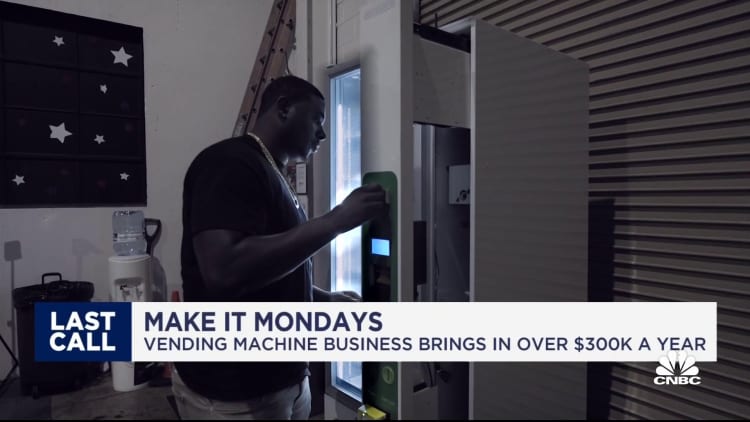
For five days a week, Abhishek works as a software developer for an IT company in Bangalore, India.
After clocking 8 hours at the office, he returns home to work for another four to five hours. But he’s not working overtime — he’s moonlighting, or taking on multiple jobs apart from his full-time employment.
The 30-year-old spends his time after work making mobile applications and websites for clients he finds on online platforms like Upwork and Fiverr.
“My end goal is to establish contacts that could pay me more than my full-time job, so that in a couple of years, I’m able to completely switch from my full time to freelance,” he told CNBC Make It.
The root cause is the money, software developers are not paid proportionate to the amount of work that they are doing. I think a lot of us would not moonlight if we feel we are paid fairly.
Abhishek
Software engineer
But his bosses are not aware of his plans, nor has he told them he is moonlighting.
Abhishek is not the only one — there’s been a 25% to 30% increase in moonlighting activities over the past three years in the country’s IT sector, according to Randstad India.
“The market is shifting from an employer-driven market to a talent-driven market,” Viswanath PS, managing director and CEO of Randstad India, told CNBC in a video interview.
“What it means is that talent is able to now command the type of work they want to do, the companies they want to work for, and how they want to use their time in the best way possible.”
‘The root cause is the money’
There are a number of reasons driving IT professionals to engage in moonlighting, according to Indeed India.
“These include the desire to supplement their income due to low salaries and rising inflation, the need for financial independence, the impact of the pandemic on job security, and the quest for entrepreneurial pursuits,” said Sashi Kumar, head of sales at Indeed India.
Abhishek, for example, has eight years of experience and is paid about $4,000 a month in his full-time job. He currently earns the same amount from moonlighting — with half the time he spends at his main job, he told CNBC.

A 2020 report from program company HackerRank found that the average salary for Indian developers is about $38,000 per year, compared to those in the U.S. — who earn almost three times more.
“The root cause is the money, software developers are not paid proportionate to the amount of work that they are doing. I think a lot of us would not moonlight if we feel we are paid fairly,” he added.
Moonlighting has also become more rampant ever since remote work became the norm during the pandemic, said Viswanath.
“In an office, employers have the ability to monitor people more closely. But in a work from home environment, you could have multiple machines that you are logging into.”
For Kumar, moonlighting is another workplace movement that has gained momentum over the past few years due to the evolving meaning of work.
“These movements reflect a changing mindset among young professionals who no longer see going above and beyond at work as beneficial,” he added.
These movements reflect a changing mindset among young professionals who no longer see going above and beyond at work as beneficial.
Sashi Kumar
Head of sales, Indeed India
“This shift has led to trends focused on work-life balance, flexibility, and breaking away from the traditional 9-5 model.”
Trend or not, an employee’s desire to moonlight does not seem to be waning any time soon, according to Randstad’s 2023 research.
It found that nine in 10 employees agreed that an employer is “much more attractive” if workers are allowed to take up additional jobs.
The desire to take up a second job is also relatively stronger among women (92%) compared to men (89%), which is indicative of the prevailing gender-pay gap, Randstad added.
Where employers disagree
Here’s where employers disagree: moonlighting goes against the sense of loyalty a company wishes to instill into employees. In some cases, the practice could be unethical.
IT services giant Wipro for example, fired 300 employees last year for allegedly “working for rival companies,” according to local reports. Its chairman shot down the practice of moonlighting in a tweet: “This is cheating — plain and simple.”
While the moonlighting or side-hustle phenomenon is not new, it presents “unique challenges” in India due to prevailing norms and company policies, said Indeed’s Kumar.

“Unlike in some other countries, where side-hustling is more accepted, many Indian companies have stringent contracts or policies that discourage employees from working elsewhere,” he added.
“Moonlighting is often perceived as conflicting with company interests, potentially leading to disengagement, productivity loss, and breaches of confidentiality.”
Employers’ concerns are not unfounded, said Viswanath, especially in the IT sector. “The sector is very data-oriented and there is a lot of intellectual property that is involved,” he added.
However, the negative perception that employers have toward moonlighting stems largely from their mindset, said Viswanath, and the lack of trust between employer and employees.
That has resulted in many companies including exclusivity clauses in contracts, stipulating that employees cannot pursue a side-hustle, even if it’s in a different industry or simply a hobby.

Indeed’s recent survey found that almost half of employers disapprove of moonlighting as they perceive it to have a negative impact on “revenue, operating margins and productivity.”
Abhishek stressed that he still consistently delivers on deadlines and deliverables at his core job, despite taking up multiple projects on the sidelines.
“I have an agreement of working with my employers to work eight hours a day … Beyond that, if there’s any personal work that I do, they should not have any problem with that,” he added.
The middle ground
Despite its growing population, India grapples with talent shortage — specifically skilled labor. According to a recent report from job portal TeamLease, over two million jobs in AI, cyber security, and blockchain are expected to remain unfilled in 2023.
It added that India will need 30 million digitally skilled professionals by 2026.
“Talent is scarce today and … if you need the best talent, you got to embrace what the talent likes,” said Viswanath.
“Previously, the second job was a need for employees, now it has become a want. Once it becomes a want, it’s about how employers can pave the way in making accommodations and ensure that both parties’ interests are equally protected.”

Ideally, favorable policies that strike the right balance should still be “crystal clear” about what an employee can or cannot do, while clearly defining the hours and days required at the core job.
“There needs to be an upfront disclosure policy where they say, if you want to take up a second job, this is the procedure and we may need to understand a little bit more about that to ensure zero conflict,” Viswanath added.
IT companies in India may just slowly warm up to the idea of moonlighting. For example, Infosys — one of India’s largest IT services companies — now allows employees to take up “gig work” with prior consent of managers, according to a local report.
That’s an about-turn from the company’s previous stance which warned against dual employment.
That requires a lot of professional discipline … upfront disclosure will give your employers assurance that moonlighting is not going to conflict with your primary employment.
Viswanath PS
Randstad India
Ultimately, it takes two hands to clap. Employees should always take the right approvals while remaining high levels of work ethic at their main jobs, Viswanath advised.
“That requires a lot of professional discipline … upfront disclosure will give your employers assurance that moonlighting is not going to conflict with your primary employment.”
Kumar added: “Assess your time management skills and ensure you can dedicate sufficient time and energy to both your primary job and the side job.”
“Finally, choose a side job that complements your skills and interests, allowing you to gain valuable experience or explore new passions.”
Don’t miss: A ‘nice’ workplace culture may be more toxic than you think, says this NYU professor
Like this story? Subscribe to CNBC Make It on YouTube!
Be the first to comment